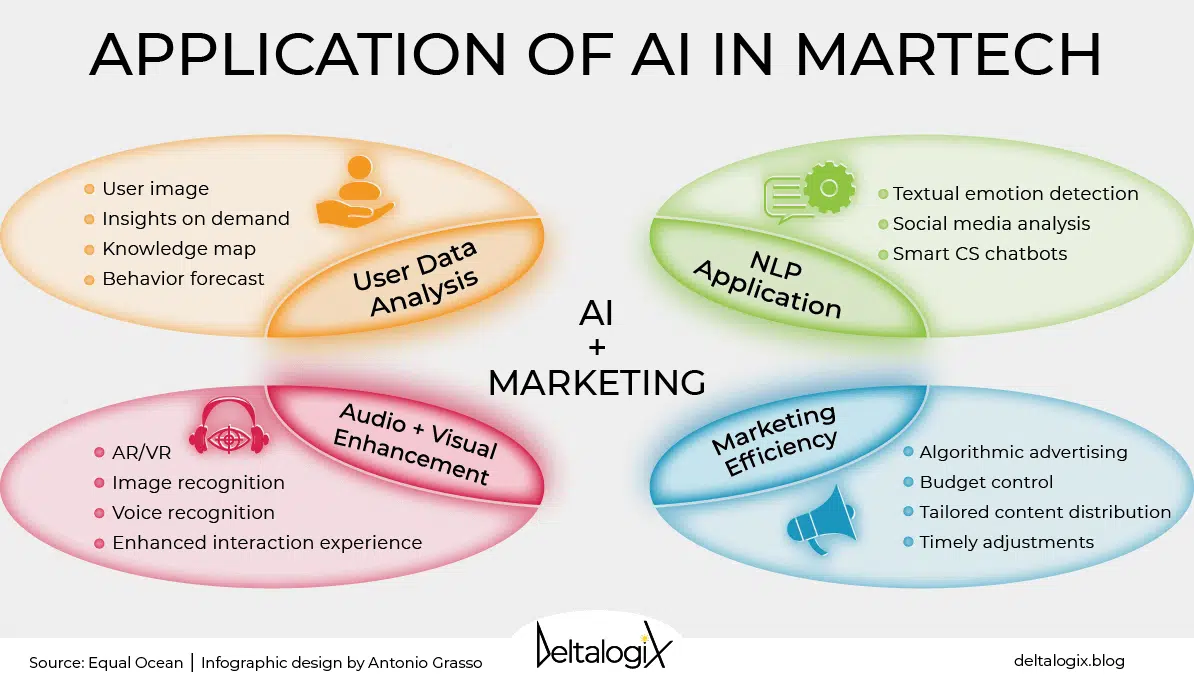Artificial Intelligence Applied to Digital Marketing: How to Transform Strategies with AI

Discover how artificial intelligence applied to digital marketing transforms strategies through automation, personalization, and data analysis.

Discover how artificial intelligence applied to digital marketing transforms strategies through automation, personalization, and data analysis.
Key Points
Introduction
Artificial Intelligence applied to digital marketing is a true revolution for the industry. By using advanced algorithms and machine learning systems, AI is changing the way companies design and execute their marketing strategies. Automation, personalization, and data analysis are some of the key terms in this new landscape. In this article, we will explore how AI is optimizing and customizing digital marketing and how you can harness its power. (Source: ui1.com, aden.org, cyberclick.com)
Today’s digital marketing faces enormous challenges, including vast amounts of data, the need for precise segmentation, and channel saturation. However, artificial intelligence offers effective solutions to these issues:
These are just some of the key aspects that explain the growing importance of AI in digital marketing. (Source: ui1.com, facs.ort.edu.uy, cyberclick.com).
There are several AI tools and technologies setting the pace in digital marketing. Among them, we can highlight:
Recent trends indicate a growing adoption of predictive marketing platforms and intelligent virtual assistants. (Source: cyberclick.com)
AI is a powerful ally for personalization in marketing. Through data analysis and machine learning, it can segment audiences and deliver messages specifically tailored to each user’s behavior and preferences. Examples of machine learning–driven personalization include:
This level of personalization translates into higher conversion rates and a much more satisfying customer experience. (Source: ui1.com, cyberclick.com)
The marketing world is in constant flux, evolving as new technologies and trends emerge. Among these trends, the following stand out:
Looking ahead, even greater integration among marketing channels is expected, with AI working in tandem with an omnichannel approach to provide a cohesive and seamless customer experience.
For those ready to embrace artificial intelligence in their digital marketing strategies, consider the following steps:
Avoid over-automation, a lack of human oversight, and strive for a balance between automation and supervision. (Source: saviacomunicacion.com, cyberclick.com).
Artificial intelligence is transforming the world of digital marketing in unprecedented ways. More and more companies are adopting a variety of AI applications to increase efficiency, personalize their marketing efforts, optimize resources, and boost their return on investment. (Source: ui1.com, aden.org, cyberclick.com).
Now that you understand the potential impact of AI on digital marketing, we invite you to seize this revolutionary opportunity. Keep exploring more AI solutions with us and stay updated with Privinia to discover further trends and insights on the future of digital marketing.
Artificial Intelligence (AI) is a technology used in digital marketing to analyze data, automate processes, and personalize the user experience.
AI is employed in digital marketing to optimize various tasks such as data analysis, audience segmentation, content personalization, campaign performance measurement, and the automation of repetitive tasks.
AI is important in digital marketing because it can handle large volumes of data, perform predictive analyses to anticipate consumer trends, and personalize each customer’s experience, thereby increasing relevance and engagement.
To incorporate AI into your digital marketing strategy, start by identifying your business’s specific needs and objectives, choosing the right AI tools for your requirements, and training your team in using these technologies.
Like any technology, using AI in digital marketing has its risks. These can include over-reliance on automation, potential privacy and data security issues, and insufficient human oversight that may lead to suboptimal decisions or errors. It is important to have robust data management practices in place and to maintain a balance between automation and human supervision.